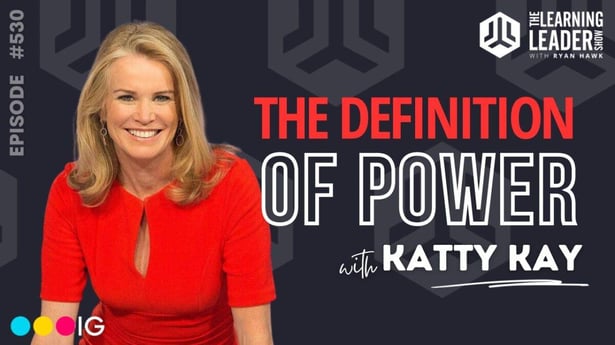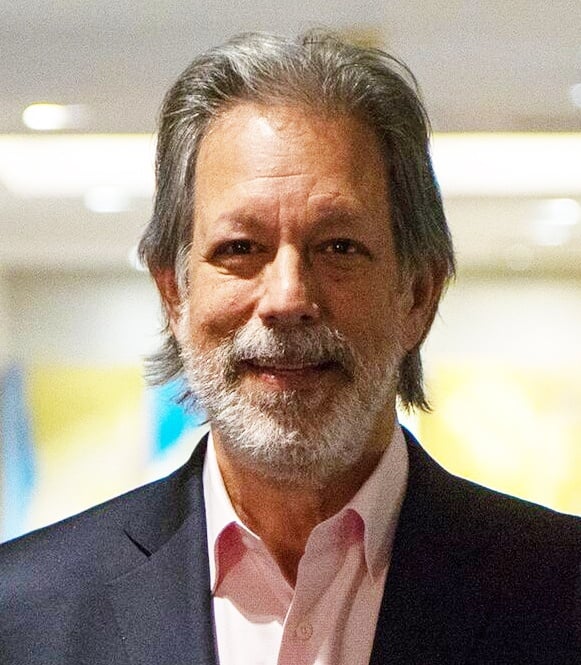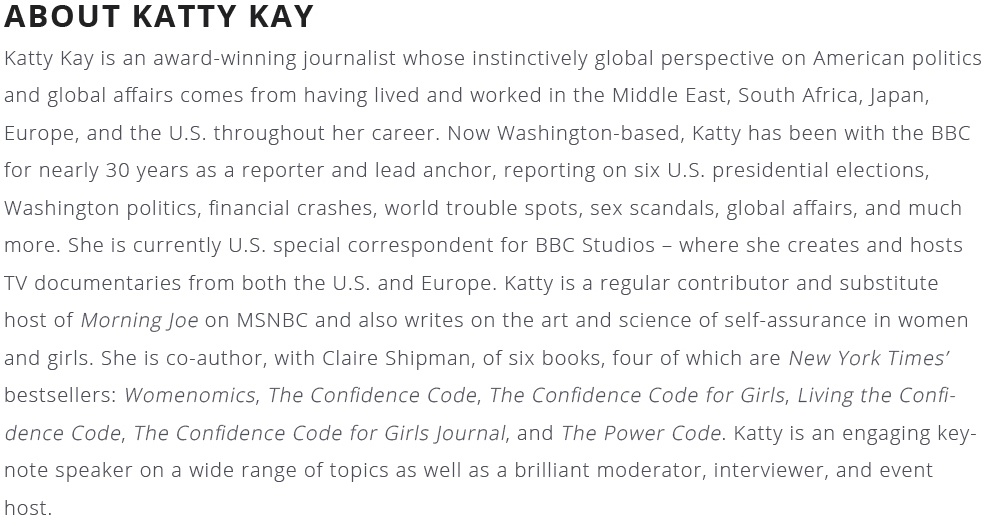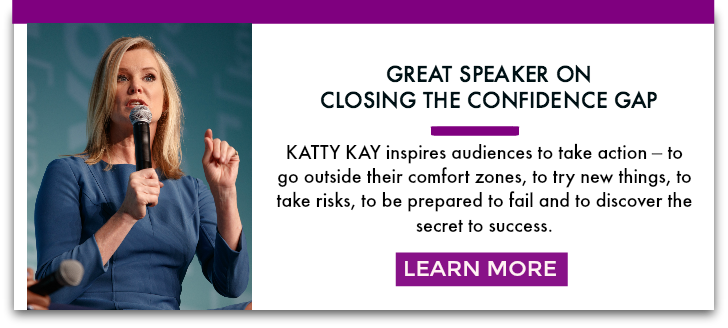THE POWER CODE – KATTY KAY’S NEW BOOK ABOUT WOMEN AND POWER
The Power Code, the new book from KATTY KAY and Claire Shipman, offers a groundbreaking, provocative take on women and their relationship with power. Their conclusion: power today is not working, for women, men, or the world.
For years, the narrative about women and power was simply that women needed more experience, more ambition, more something, and then, finally, they’d be ready for power.
The problem, more or less, was with women. But looking to answer the maddening question of why women still don’t have anything close to an equal share of the world’s power, despite the fact that multiple studies show all organizations are better off with more women running things, they’ve unearthed some radical things about power itself.
It turns out we don’t need to remake women; we need to remake power.
Katty Kay explained in a recent conversation.
SURPRISING FINDINGS IN THE POWER CODE
After we wrote The Confidence Code, Claire Shipman and I had conversations with women about their views on assuming power and leadership. Those conversations were quite revealing and led to years of research into the topic.
This research showed shows no matter how you define power, women are looking at it and saying, no thanks. The cost of getting it is too high. The compromises we have to make in the rest of our lives are just overwhelming if we want to get to those higher positions of power.
And actually, when we see power in action, when we look at people who have power, we frankly find it pretty unappealing. There's a lot of egos jostling, there's a lot of mansplaining that goes on at the top, there's a lot of behavior that I think often women don’t find particularly motivating for them.
Women look at the cost of getting there. They look at what it looks like when you have it, and it's kind of a turnoff, which perhaps is not surprising because power structures have been built by and for men over the centuries and they weren't molded by women.
ORGANIZATIONS FARE BETTER WHEN WOMEN HAVE POSITIONS OF POWER
We do know from our research that when you do have women in positions of power, organizations perform better. There is just so much evidence for this now. Dozens of international studies – one recently from the International Monetary Fund that showed that organizations with more women in positions of leadership are outperforming their competitors by every measure of profitability.
Our goal with The Power Code was to look at those two problems together. We need more women in positions of power, but women don't want power. How can we solve this problem?
REDEFINING POWER
And what we've found over the course of writing this book is that it's not really that you need to change women. Women are exercising power already in many ways. We are getting things done. We juggle all of the myriad bits of our lives. We are achieving very well at work. What really needs a rethink is power itself, how we define it, how we wield it, how we use it, how we let people get it, and what the paths to getting it are.
Our conclusion was that if you could do that, if you could kind of reconceptualize power and the roots to power, actually everybody would be better off. You would end up with power structures that were much more effective.
MORE JOY. LESS EGO. MAXIMUM IMPACT FOR WOMEN (AND EVERYONE)
The subtitle tells a lot about the book. We spent almost as long on the subtitle as the book as we did on the title of the book. The Power Code: More Joy. Less Ego. Maximum Impact (for Women – and Everyone) really tells the story of this book – that there can be joy to be had in power. And I think we have to try and overcome women's reticence about taking the reins by pointing out what you can do with power.
In the book we urge women to think of power as something that can be effective in meeting your goals – what it can do for your community, what it can do for your organization. If we think of the “why” of power, of having power to achieve things, I think suddenly power becomes a more appealing prospect to women. Less ego, because we think it doesn't need to be about ego. It can be about work. Work environments do better when people focus on the work itself and the results, not just the egos involved. And maximum impact because this is really a way of thinking about power that produces results that are good for organizations.

WOMEN LEAD DIFFERENTLY
When you look at all the studies that show organizations do better when they have more women in positions of power, it's not random. It's because of the way that women work. We are open to collaboration. We take a longer-term view of things.
If you look at wealth funds that are managed by women, they tend to perform a little bit flatter. There are fewer of the highs and fewer of the lows that there are in funds run by men.
It's also true of women in political leadership and in something like crisis management around COVID as well. The more you collaborate, the more you can take your own ego out of the equation. It’s less about grandstanding, and more about results. All of those are things that play very well to women's skills – being good listeners, being good negotiators, being good mentors, being good at building consensus in a group. All of those are incredibly effective tools in crisis management. Those skills are very effective tools in politics. They're very effective tools in business.
A NEW WAY OF EVALUATING WOMEN’S SKILLS
As we were writing The Power Code we learned how some leaders of organizations are starting to evaluate those skills differently. For example, we interviewed Christine Lagarde, who was the head of the International Monetary Fund and is now the head of the European Central Bank. She said, “I had an epiphany when I looked at my daughter-in-law juggling having a three-year-old toddler and a newborn child.” This daughter-in-law had taken a bit of time off work and Lagarde said, “I saw what she was doing. She was managing crises, she was communicating, she was negotiating, she was running a household. Those are exactly the same kind of skills if you took them out of the family realm, if you took them out of the realm of raising a toddler and a baby, any company would think, of course, that smacks of leadership. Oh, and throw in empathy as well, which every parent and mother has, of course.”
Lagarde went back to the European Central Bank and she actually said to her board, “The time that women take out of their resume when they are rearing children, I want a credit for our potential hires on those years because actually those skills are very useful and we need those skills in our organization.”
That led Claire and I to think there are more creative ways of thinking about power. We could enable people who have found it difficult to access power or who have been reluctant to take the reins. That would impact their lives and the organizations they work for in very positive ways.
ORDER YOUR COPY OF
THE POWER CODE: MORE JOY LESS EGO MAXIMUM IMPACT (FOR WOMEN – AND EVERYONE)
PIONEERING WOMEN TALK ABOUT POWER
We interviewed a number of women at length to find out how they got their power, how they use their power, how they understand power, why they have power, and what it's like for them having power. It was really useful to have these women just talk about it in a very frank and honest way in which they talked about the compromises they made to get there, how they use power.
One of the women is a national assemblywoman in the Parliament in Senegal where I spent some time with my family a few years ago. I chased her down and interviewed her and she talked about power as a tool. She said for her power meant the ability to get lighting into maternity clinics so women could give birth with a little electric light and separate toilets into schools for girls so that they didn't have to miss a week of school when they were menstruating. And I just thought that was such a great way of thinking about power. It's a tool. And the other thing she said that was so inspiring was that when the law changed in Senegal, which suddenly meant that there were a lot more women elected to public office.
And when all of these women came into the National Assembly, at first the men were kind of horrified and thought they were just there to kind of show off their bright scarves and long dresses and weren't actually going to do anything. They quickly found these women had an agenda to make life better for families in Senegal by doing things like putting lights into maternity clinics. She said when it came to pulling up the budget, the men said, we need a new mosque or we need a big new town square. And the women said, no, we need toilets for girls in schools and we need electric lights in maternity clinics. And she said, actually, the men just never really thought of the world like that. They hadn't seen the world like that. That was not their lived experience.
We also interviewed Zanny Minton Beddoes, who is the first female editor-in-chief of The Economist. Minton Beddoes said she doesn't like necessarily to use the word “power” because it has for women so many negative connotations. She thinks of it in terms of leadership, and the way she finds real satisfaction is by thinking of the organization of a whole. She says she gets intense satisfaction when the magazine as a whole does really well and when the people working under her are really satisfied with their jobs.
And she says, “I love giving credit to other people.” Whenever the magazine does well, her first instinct is to give credit to other people. It's not just a great motivational tool. It also is a defining aspect of how women think about power. She said, “I don't want this to sound like a kind of Pollyanna-ish cliche, but it's really not about me, it's about the organization.”
WHAT DO YOU THINK ABOUT POWER?
Take The Power Code survey: https://www.kayandshipman.com/power-survey
About Tony D'Amelio
Tony has spent his career putting talented people and audiences together, first in the music business and later representing the world's leading speakers. After concluding 27 years as Executive Vice President of the Washington Speakers Bureau, Tony launched D'Amelio Network, a boutique firm that manages the speaking activities of a select group of experts on business, management, politics and current events. Clients include: Mike Abrashoff, Mariana Atencio, Chris Barton, Lisa Bodell, Geoff Colvin, Daryl Davis, Suneel Gupta, Ron Insana, Katty Kay, Polly LaBarre, Nicole Malachowski, Ken Schmidt, and Bob Woodward.

.png)

.jpg)


